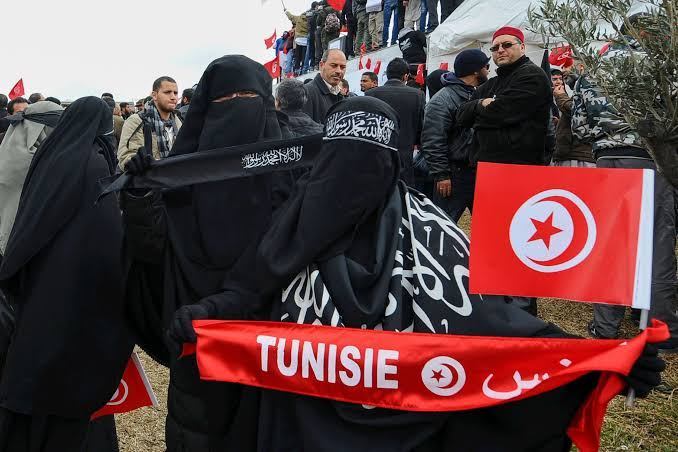
Tunisia has banned the niqab in public institutions after two suicide bombings rocked the capital last week, becoming the latest country to outlaw the orthodox religious garment in the aftermath of terrorist attacks.
Prime Minister Youssef Chahed cited security concerns when he signed an order Friday barring anyone wearing a face covering from entering public establishments, the Agence France-Presse reported — effectively prohibiting women from wearing the niqab, a veil that covers nearly the entire face.
The move is sure to generate opposition and recalls restrictions on veiling in Tunisia under two successive authoritarian regimes that enforced the ban in the name of security, but critics said used it to discriminate against conservative Muslim women. After Tunisia’s 2011 popular uprising that unseated longtime president Zine El Abidine Ben Ali, women began wearing the veil in greater numbers.
The two suicide bombings in Tunis last week left two dead and several injured, sparking fear and panic in the relatively peaceful North African country at the peak of its tourism season. The Islamic State claimed responsibility for the attacks, and the alleged mastermind of the plot, 23-year-old Aymen Smiri, was killed during a manhunt Tuesday night when explosives he was carrying detonated on a street in Tunis.
Tunisia’s interior ministry published a statement after Smiri’s death disputing rumors that he had disguised himself as a woman or worked with a female accomplice.
With Friday’s order banning the garment, Tunisia joined a growing list of countries that have banned the niqab out of concern that full body coverings can hide weapons or explosive devices used to carry out terrorist attacks. Sri Lanka banned face coverings after deadly attacks on Easter earlier this year. Cameroon outlawed full-face veils in a northern region after two women wearing them blew themselves up and killed 13 people in 2015. And Algeria prohibited women from wearing the niqab at work in 2018.
It’s not the first time in recent years that Tunisia has sought to enforce a dress code for security reasons. The Tunisian government announced it would “tighten procedural controls” on the niqab in 2014, although it is unclear what that actually meant. The Tunisian parliament also introduced a bill, which was never passed, to outlaw the niqab in 2016 following two major terrorist attacks in Tunis and Sousse that threatened Tunisia’s stability and dealt severe blows to the country’s tourism industry.
Tunisia, widely viewed as the Arab Spring’s sole success story, has struggled to maintain stability and safeguard its democratic transition since the 2011 revolution. Terrorism poses a particular threat, as the country’s youth unemployment rates have soared and Tunisia constituted one of the leading exporters of foreign fighters to the Islamic State. Tunisian authorities are now grappling with the prospect of those fighters returning home.
Amid fears of terrorist attacks, countries that have adopted niqab bans say authorities must be able to see faces for identification purposes.
But critics say restrictions on veiling amount to state-sponsored religious discrimination and limits on freedom of expression. These bans have tapped into a larger debate about the role governments should play in religion that have raged across Europe and the Middle East.
A number of European countries, which pride themselves on their secular orientations, have prohibited Islamic face or hair coverings – sometimes citing security reasons, but often on the grounds that the clothing represents an encroachment of religion on public life. But many Muslims and human rights organizations have decried laws like France’s burkini bans and Denmark’s niqab ban as Islamophobic. Historically, European colonial powers in the Arab world pointed to the veil as a sign of societal backwardness and used it to justify colonialism.
Veiling — and prohibitions of the practice — has had a particularly fraught history in Tunisia, a Muslim-majority country known for both its strong secular and Islamist movements. Former president and founding father Habib Bourguiba imposed state secularism after Tunisia gained independence from France in 1956, and he infamously removed veils from Tunisian women on the streets.
A law passed in 1981 banned women from wearing headscarves or veils in public, and women faced harassment or arrest for defying the law — particularly after Ben Ali took power in 1987. Veiled women were expelled from schools, prevented from working in the public sector and forced to frequently check in at police stations.
Although Tunisian authorities claimed to be promoting women’s rights to justify prohibitions on veiling, experts say these policies were aimed at cracking down on Islamists, who constituted the largest and most fiercely repressed political opposition group under the Ben Ali regime.
The 2011 revolution ushered in an Islamist-led government and a visible relaxation of dress codes. Although the 1981 law has remained in place, freedom of dress expanded considerably and more women wore some sort of head covering. The range of religious observance among Tunisians in recent years can be seen on the country’s Mediterranean beaches, where women in bikinis stroll next to women wearing the full black niqab.
Still, the niqab is relatively unpopular in Tunisia; a 2014 Pew poll found that 57 percent of Tunisians thought the less restrictive hijab was the most appropriate form of attire for women, while only two percent indicated they thought women should wear the niqab.
You may be interested

PSG To Reignite Interest In Osimhen
Webby - December 21, 2024Paris Saint-Germain have contacted Napoli to discuss signing Victor Osimhen in January, according to reports in France.It is reported that…

Arteta Provides Injury Updates On Five Arsenal Players Ahead Palace Clash
Webby - December 20, 2024Arsenal manager Mikel Arteta has revealed that Declan Rice and Riccardo Calafiori are both available to be in the Gunners…

Carabao Cup: Spurs Edge Man United In Seven-Goal Thriller To Reach Semi-finals
Webby - December 19, 2024Tottenham Hotspur edged Manchester United 4-3 in the quarter-finals of the Carabao Cup on Thursday.Spurs raced to a 3-0 lead…




















![American Pastor, David Wilson Seen Eating The Box Of Woman Who Isn’t His Wife [Video]](https://onlinenigeria.com/wp-content/uploads/2019/10/american-pastor-david-wilson-seen-eating-the-box-of-woman-who-isnt-his-wife-video-150x150.jpg)









